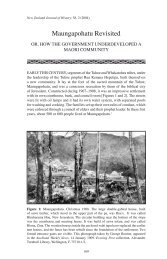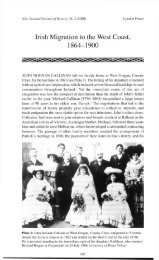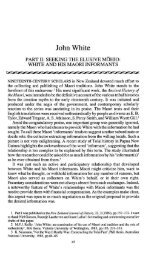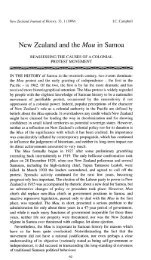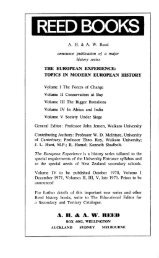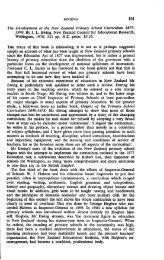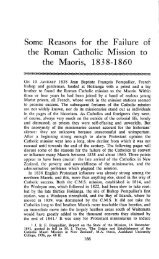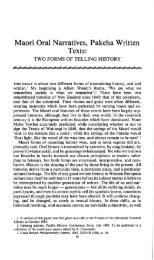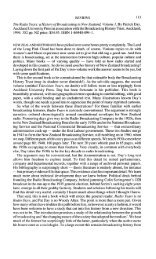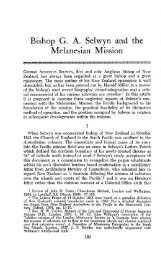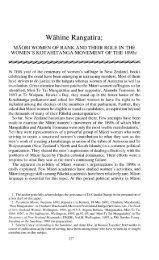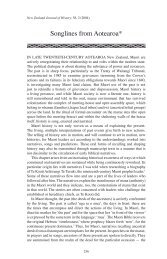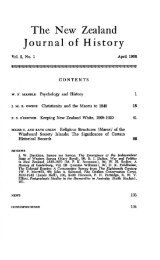Friendly Societies 1842-1938 - New Zealand Journal of History ...
Friendly Societies 1842-1938 - New Zealand Journal of History ...
Friendly Societies 1842-1938 - New Zealand Journal of History ...
Create successful ePaper yourself
Turn your PDF publications into a flip-book with our unique Google optimized e-Paper software.
130 JENNIFER CARL YON<br />
plumbers and carpenters were receiving a weekly wage <strong>of</strong> up to 66s., general<br />
labourers 45s., bakers 45s., and farm labourers 20s. 33 By 1925 the minimum<br />
weekly award rates <strong>of</strong> pay were for bakers 99s., masons, carpenters and plumbers<br />
between 96s. and 99s., for general labourers 75s. and for farm labourers 55s. 34<br />
The sick rate, which in the 1880s had compared favourably with the minimum<br />
weekly wage rates, was by the 1920s, worth considerably less. Nevertheless, it<br />
must be remembered that even with the considerable drop in real worth <strong>of</strong> the<br />
friendly society sickness benefits by the 1920s, it was the only affordable way<br />
in which many working people could be assured <strong>of</strong> some income, albeit reduced,<br />
in time <strong>of</strong> need. The effects <strong>of</strong> accident or ill health could be calamitous for<br />
workers and their families, pushing them into abject poverty and forcing them<br />
to apply for public relief. As Tennant has described, having to prove genuine<br />
need to relieving <strong>of</strong>ficers was <strong>of</strong>ten a humiliating and degrading experience, and<br />
if relief was granted it was frequently given in kind, with the stigma <strong>of</strong> charity<br />
attached. 35 The friendly society cash benefit, small though it was, was not<br />
charity, but a right, earned by paying regular contributions into a fund.<br />
Because a sound sickness fund was critical to the financial health <strong>of</strong> the lodge<br />
every precaution was taken to prevent any imposition on the funds. Strict rules<br />
regulating the sick benefit were put in place and usually rigidly enforced. 36 For<br />
a member to be able to claim the benefit, first an examination by the lodge doctor<br />
was necessary, after which the doctor was required to sign a standard certificate<br />
<strong>of</strong> ill health and immediately forward it to the secretary <strong>of</strong> the lodge. The doctor<br />
was then expected to keep a close eye on the patient for the duration <strong>of</strong> the illness,<br />
sign a sick attendance sheet to enable the member to continue to receive the<br />
benefit every week and to report, either in person or in writing, to the fortnightly<br />
lodge meeting on the sick member's state <strong>of</strong> health. If the patient was able, a<br />
twice weekly visit to the doctor was mandatory. 'Any member failing to visit the<br />
Medical Officer <strong>of</strong> the Lodge as aforesaid shall be liable to a fine <strong>of</strong> five shillings<br />
unless satisfactory reasons be given for not complying with this clause. ' 37 Should<br />
the member be unable to visit the doctor then 'It shall be the duty <strong>of</strong> the medical<br />
<strong>of</strong>ficer to attend the sick member at his residence at least once in every week.' 38<br />
All claims were closely vetted at the fortnightly lodge meeting, and passed for<br />
payment providing the claimant had not breached any <strong>of</strong> the lodge rules. Not<br />
33 Statistics <strong>of</strong> <strong>New</strong> <strong>Zealand</strong>, Wellington, 1885, p.203.<br />
34 ibid., 1926, p.57.<br />
35 Tennant, particularly chapters 5 and 9.<br />
36 As the rules regulating the sickness benefit were standard amongst all the Orders, and remained<br />
virtually unchanged from the 1850s to 1940s, except where specified, the above description is based<br />
on the General Laws <strong>of</strong> the Ancient Order <strong>of</strong> Foresters, Hawkes Bay District, 1883.<br />
37 Rules <strong>of</strong> the Loyal Remuera Lodge, No.8785, <strong>of</strong> the Auckland District <strong>of</strong> the <strong>New</strong> <strong>Zealand</strong><br />
Branch Manchester Unity Independent Order <strong>of</strong> Oddfellows <strong>Friendly</strong> Society, 1913, Auckland,<br />
1913, p.22.<br />
38 Rules <strong>of</strong> the Ancient Order <strong>of</strong> Foresters, Court Takapuna, Auckland, 1929, p.41.



